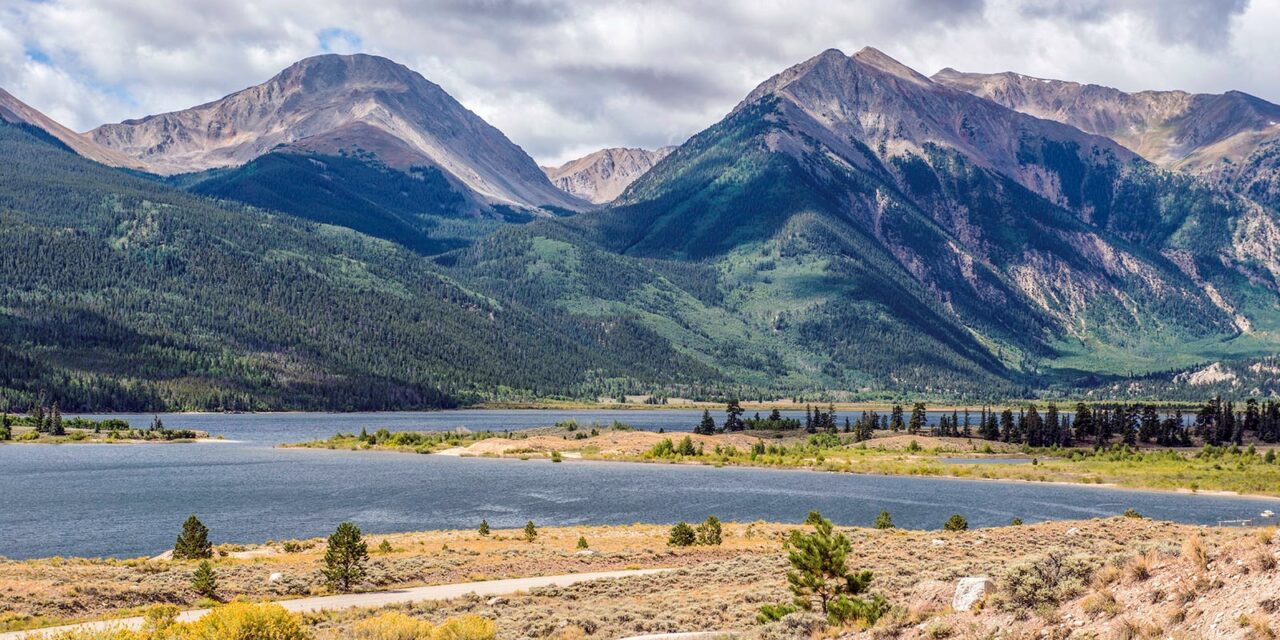Multiple officials with the City of Aurora, the third-largest municipal water provider in Colorado, attended the June board meeting of the Upper Arkansas Water Conservancy District in Salida to discuss their recent purchase of water rights in the Arkansas River Basin.
Aurora paid $80.4 million to buy an Otero County farming operation, including water rights used to irrigate 4,806 acres – about 7,500 acre-feet of water per year, depending on the annual conditions like snowpack and streamflows. Most of those rights are shares in the Catlin Canal Co.
The purchase has been condemned by Chaffee County and the Upper Ark Conservancy District as well as the Southeastern Colorado Water Conservancy District. Both conservancy districts claim that exporting the water to Aurora will violate various terms of intergovernmental agreements, or IGAs, signed in 2003.
The 2003 IGA between Aurora and the Southeastern District states, “Aurora shall not initiate or seek to implement any further permanent transfer of water rights … from sources in the Arkansas River basin” for the next 40 years.
Interruptible Water Supply Agreements
During the meeting, Rick Kienitz, Arkansas Basin water resources manager for Aurora, acknowledged that the city plans to export its newly acquired water three out of every 10 years for at least 30 years using an Interruptible Water Supply Agreement, or IWSA.
IWSAs allow the State Engineer (Division of Water Resources) to approve temporary changes of water use for three out of 10 years without the due process provided by Water Court, which provides a higher degree of protection for water rights that could be injured by changes in water use.
In 2003, the same year that Aurora signed its IGAs with the Southeastern and Upper Ark water conservancy districts, the General Assembly passed legislation (HB 03-1334) allowing these temporary changes of water use.
IWSAs allow water rights owners to lease water for uses other than the court-approved use for that water – e.g., a farmer who owns an irrigation right can lease his water to a city for municipal or industrial use. In this case, Aurora is leasing out the farm and promising to keep the water on the farm for seven out of 10 years.
Prior to 2003, changes of water use had to be approved in Water Court. HB 03-1334 circumvented Water Court, and 10 years later, HB 13‐1130 allowed for IWSAs to be re-approved twice for a total of 30 years.
Aurora was a major supporter of this legislation, which allows the city to export 30% of its Ark Basin water out of the basin over the course of 30 years, and as Kienitz noted, Aurora already gets 25% of its municipal water from the Arkansas Basin.
At the Upper Ark meeting, board member Mike Shields emphasized that Aurora’s plans would take 30% of its newly purchased water out of the basin for decades, which seems to be at odds with the IGAs.
Kienitz asserted that the transfer of this water does not violate the IGAs because it is temporary.
Upper Ark board member Tom Goodwin, who also serves on the Southeastern District board, said the original intent of the IGAs was that “Aurora would not buy more water in the Arkansas Valley.”
Aurora’s plan “seems like a shell game,” Goodwin said. “It gives the impression that, ‘We’ll try to manipulate this any way we can.’ And a lot of our constituents are saying very loudly, ‘Don’t let Aurora take another drop of water.’”
Upper Ark attorney Kendall Burgemeister pointed out that state law does not allow Aurora to use an IWSA “in perpetuity. So eventually, you’ll have to go to Water Court.”
Kienitz said Aurora would “go to the legislature to address that” in order to avoid Water Court, essentially admitting that Aurora will continue to use its political influence to erode state water law enshrined in the Colorado Constitution* – i.e., to continue taking 30% of its Ark Basin water for as long as possible.
Moving Water Upstream
When Upper Ark General Manager Terry Scanga asked if Aurora is planning on drying up all 4,800 acres of farmland in a single year, Kienitz replied, “We can’t rotate acreage” for more than 4,000 acres because the IGAs are more restrictive than the IWSA legislation.
Scanga asked how Aurora plans to move that much water out of the basin in a single year.
“When this is needed, it will be a dry year,” Kienitz responded. “There should be storage space in reservoirs.”
Aurora needs reservoir storage because the process of transferring water from Aurora’s Otero County farming operation into the city’s municipal water system is complicated.
First, it requires a “reservoir exchange” of water – i.e., Catlin Canal water is traded for water stored upstream in Pueblo Reservoir, normally Fryingpan-Arkansas Project water.
Moving water upstream through an administrative or decreed physical exchange is only possible when river flows are sufficient to permit the exchange without injuring senior water rights between the two exchange points.
In dry years exchange potential is limited, but Kienitz did not address this limitation when responding to Scanga’s question.
Little by little, when river flows allow, Aurora can exchange its water into Pueblo Reservoir, built as part of the Fryingpan-Arkansas Project, which brings water into the Arkansas River from the West Slope.
Once Aurora exchanges its Catlin Canal water into Pueblo Reservoir, it plans to trade that water for Fry-Ark Project water in Twin Lakes.
From Twin Lakes, the water could then be diverted and pumped into the South Platte Basin through the Otero Pipeline, jointly owned by Aurora and Colorado Springs.
As stated in the Upper Ark District’s resolution opposing Aurora’s plan, trading water from Pueblo Reservoir for water in Twin Lakes and then exporting it through the Otero Pipeline would reduce Arkansas River flows between Twin Lakes and Pueblo Reservoir.
Preserving Agriculture
Kienitz repeatedly emphasized Aurora’s commitment to preserving agriculture in the Arkansas Basin. He said Aurora plans to maintain ag production on the newly acquired Otero County property by leasing it to “a farming company.”
Upper Ark board member Bill Donley, a rancher in Custer County, asked Keinitz, “How do you keep an alfalfa field if you dry it up?” (Alfalfa is a perennial crop, but in Colorado, it requires irrigation to survive year-to-year.)
“You can’t,” Kienitz replied, so we’ve addressed that through the lease with the farmer to compensate for that loss,” adding that the farmer could also look at growing dryland crops.
According to long-time farmers like Matt Heimrich, attempts at dryland farming on dried-up Ark Basin farmland have not succeeded.
Heimrich farms in Crowley County, which borders Otero County, and he said he’s never seen a dryland crop in Crowley County, nor has his family, which came to the county in the 1950s.
Heimrich told the Colorado Springs Gazette that dryland farming “is a terrible challenge” because soils change after decades of farming. “It’s not that healthy, native soil that you would see on the prairie. … It’s very silty, and when the ground has been used for crop rotation, its ability to sustain dryland seeding or farming is diminished.”
Farmer vs. Developer
The “farmer” with whom Aurora has contracted to run a profitable agricultural business is C&A Companies.
C&A Companies is registered with the State of Colorado as a “holding company,” and its website identifies C&A as “a diversified real estate firm based in Denver.”
The website also states, “C&A and its stakeholders currently own and control one of the largest privately owned water holdings in the West. … The principals … sit on the boards of various metropolitan districts,” which include municipal water operations.
One of those principals is C&A co-founder Karl Nyquist, whose background is in real estate and investment banking.
As Marianne Goodland wrote in a 2018 Colorado Springs Gazette article, “Nyquist isn’t a farmer. He’s a developer with a portfolio of multimillion dollar deals all along the Front Range. He’s also been generous with political contributions over the past half-dozen years.”
Writing for the Pueblo Chieftain in 2011, Chris Woodka reported that Nyquist attempted to export up to 12,000 acre-feet of water per year from the Arkansas Basin to growing Front Range communities in the South Platte Basin.
Nyquist proposed building a $350-million, 150-mile pipeline to move the water but withdrew the proposal in the face of stiff opposition from Lower Ark Basin farming communities.
“Mr. Nyquist claims his pipeline would benefit Prowers County,” reads a Chieftain editorial from 2011. “We think he’s peddling snake oil.”
The Chieftain criticized another of Nyquist’s efforts to remove water from Ark Basin farmland in 2016, stating, “Nyquist has a notorious history of diverting agricultural water from the Arkansas River Valley to the Northern Colorado cities surrounding Denver. … We don’t trust Nyquist.”
Photo: Twin Lakes Reservoir is part of the Fryingpan-Arkansas Project. For Aurora to use its newly acquired water, it will need to get the water into Twin Lakes and then pump it into the South Platte River Basin through the Otero Pipeline.
* During the past 15 years, Ken Baker’s reports to the Upper Arkansas Water Conservancy District have warned that legislative efforts to bypass Water Court are undermining constitutional water law. Baker played a key role in establishing the District, served as its attorney for many years, and consulted with the District on legislative matters until his recent retirement.
Related coverage:
Conservancy District opposes major water purchase by Aurora
Upper Ark District, Chaffee County condemn Aurora water plans





